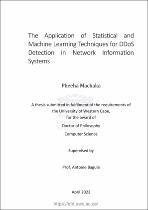| dc.contributor.advisor | Bagula, Antoine | |
| dc.contributor.author | Machaka, Pheeha | |
| dc.date.accessioned | 2023-05-15T07:34:35Z | |
| dc.date.available | 2023-05-15T07:34:35Z | |
| dc.date.issued | 2022 | |
| dc.identifier.uri | http://hdl.handle.net/11394/9947 | |
| dc.description | >Magister Scientiae - MSc | en_US |
| dc.description.abstract | A surge of large-scale Distributed Denial of Service (DDoS) attacks has swept the internet in recent years, possibly presenting a serious threat to industry internet service offerings. These attacks take advantage of susceptible devices linked to the internet via the Transmission Control Protocol (TCP) and the Internet Protocol (IP). As a result, current Internet-of-Things (IoT) devices are no longer off-limits. DDoS attacks have become stealthier and more sophisticated as they aim to circumvent conventional detection systems as the number of connected devices has grown. They do this by deploying both low-rate and high-rate DDoS attack techniques. | en_US |
| dc.language.iso | en | en_US |
| dc.publisher | University of the Western Cape | en_US |
| dc.subject | Science | en_US |
| dc.subject | Statistics studies | en_US |
| dc.subject | Network Information Systems | en_US |
| dc.subject | Cybersecurity | en_US |
| dc.subject | Cyber attack | en_US |
| dc.title | The application of statistical and machine learning techniques for DDOS detection in network information systems | en_US |
| dc.rights.holder | University of the Western Cape | en_US |

